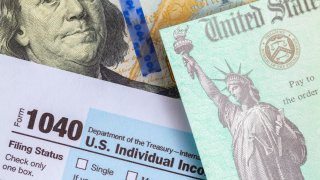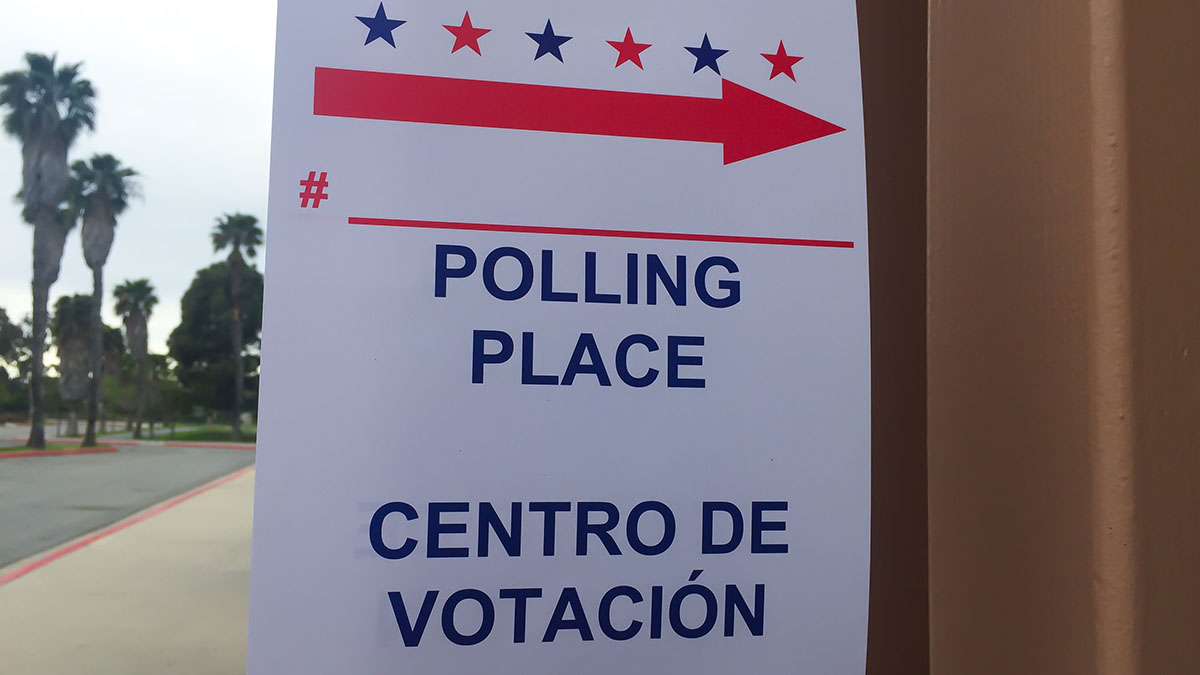
Americans will head to the poll on Nov. 8 to vote in the midterm elections, with control of Congress and the future of President Joe Biden's agenda on the balance.
Democrats hold a razor-thin margin in the House (221-212) and the Senate is split 50-50, with Vice President Kamala Harris holding the tie-breaking vote. Republicans are aiming to pick up one, if not both, chambers of Congress.
Historically, the president's party loses Congress in the midterm, and this year Republicans only need to gain six seats in the House to retake majority control from Democrats. In the Senate, the GOP only needs to gain one seat.
And while issues like abortion, immigration and gun control are at stake, so are tax priorities. Republicans and Democrats have different views on tax deductions and incentives, and who controls the House and Senate will dictate which tax policies are advocated for and potentially passed into law.
Get South Florida local news, weather forecasts and entertainment stories to your inbox. Sign up for NBC South Florida newsletters.
How will a Republican-controlled Congress impact my taxes?
If Republicans take control of Congress in this fall's election, protecting previously passed policies will be among the party's top priority, said Alex Brill, a senior fellow at the American Enterprise Institute for Public Policy Research, a conservative think tank based in Washington, D.C.
There are a number of tax provisions set to expire in 2025 that were passed as part of the Republican's Tax Cuts and Jobs Act, the 2017 legislation which slashed the corporate tax rate, temporarily cut rates for individuals and limited deductions for state and local taxes, also known as SALT. Among the tax breaks set to revert to its pre-2017 levels are the individual income tax rate — which will return the top marginal rate to 39.6% from the current 37% — the increased child tax credit and the higher standard deduction, meaning most taxpayers can expect to see a tax hike unless these clauses are extended.
Nebraska Rep. Adrian Smith, who is vying for the leadership roll on the powerful tax-writing Ways and Means committee should Republicans win the House, said in an interview on C-SPAN last month that if the GOP regains Congress, advancing legislation that would make the individual tax rate cuts permanent would be his first priority. It is not clear whether extending the higher child tax credit and standard deduction would also be a policy agenda for Republicans.
However, many economists have argued that the GOP tax plan goes against their promise to fight inflation and reduce the federal deficit. Howard Gleckman, a senior fellow at the Tax Policy Center, argues that extending these cuts may further fuel inflation because "putting more money in people's pockets" will stimulate consumer spending.
In June, the Republican Study Committee, a caucus of over 150 House Republicans, released its annual budget proposal outlining the party’s fiscal stance for spending, revenue and tackling the deficit over the coming decade.
The budget calls for nearly $12.5 trillion of deficit reduction over the next 10 years, paid for mainly through cuts to social safety net programs:
- $3.3 trillion in cuts to Medicaid, CHIP and the Affordable Care Act exchange
- $2.5 trillion in cuts to Medicare
- $700 million from Social Security
- $3.4 trillion in cuts to nondefense discretionary spending. (This includes eliminating the Legal Services Corporation, the McGovern-Dole International Food for Education Program, the National Endowment for the Arts, and the National Endowment for the Humanities, among other programs)
- $3.5 trillion in reduction to "other mandatory programs." (This includes reforms to agriculture subsidies, changes to higher education financing, ending government conservatorship of Fannie Mae and Freddie Mac, reforming policies related to federal employees and their pensions, changing veterans disability benefits)
- $1 trillion in interest savings
More Decision 2022 Coverage:
The Republican's budget proposal also seeks to enact full expensing for businesses, repealing the estate tax and preventing double taxation of remote workers. It calls for creating Universal Savings Accounts that are similar to Roth IRAs, but without income limits or retirement requirements to withdraw, and they would be free from being taxed on interest and capital gains.
The cost for the these proposals would be paid for in part by eliminating the deductibility of state and local taxes on federal returns (SALT), Lifetime Learning Credit, American Opportunity Credit and Student loan interest payment deductions.
The plan proposes a gradual increase of the eligibility for Medicare from 65 years old to 67 and raises the Social Security eligibility age from 62 to 70. The proposal also includes reducing payroll taxes that fund Social Security and redirecting beneficiaries to private alternatives.
And while most of these proposals would be vetoed by President Biden even if they did pass in Congress, Republicans could use the debt ceiling or a government shutdown to force some of the issues.
How will a Democratic-controlled Congress impact my taxes?
While Democrats campaigned on rolling back provisions from the 2017 tax bill, actually doing so has proven politically difficult for the party due to its razor-thin majority in Congress.
Earlier this year, Democrats tried to increase the corporate tax rate and raise taxes on the wealthy to pay for the Inflation Reduction Act, but failed in large part because of opposition from one Democratic Senator: Kyrsten Sinema of Arizona. Instead, they passed a new 15% minimum tax on corporations making over $1 billion a year to ensure that large and profitable companies pay more than $0 in federal taxes.
Any substantive changes to the individual and business tax rates probably won't come until 2025, when the provisions of the 2017 Tax Cuts and Jobs Act expire. If Democrats control the White House and Congress then, they'll likely let the lower rates sunset.
Seth Hanlon, a senior fellow at the liberal think tank Center for American Progress, notes that Democrats have “unfinished business" items that failed to make it in the Inflation Reduction Act. Chief among them is reviving the expanded child tax credit, which expired in December 2021.
Democratic lawmakers in high tax states like California, New York, Illinois and New Jersey have vowed to continue to lobby for a repeal of the SALT cap, which also failed to be included in the final version of the party's climate, health care and taxes legislation. The limit on federal deductions for SALT is a pain point for costly states because residents can't deduct more than $10,000 in state and local taxes on their federal returns. Even some Republican congressional candidates have made it an issue for the midterm elections.
Rep. Bob Menendez, D-N.J., said in a statement that he and other members of the SALT Caucus will "continue working to find a path forward" to repeal the SALT cap.
Another Democratic proposal is to shore up Social Security by imposing additional payroll taxes for higher-income earners, CNBC reports. The safety net, which provides millions of retired beneficiaries monthly checks, is facing a funding shortage and will only be able to pay 80% of benefits starting in 2035. The Social Security 2100 bill calls for enhancing the benefits and paying for it by reapplying the payroll tax on wages of $400,000 and up. In 2022, Social Security payroll taxes are applied on up to $147,000 in income, a level that is adjusted each year. However, the plan only extends Social Security's solvency for another three years, according to CNBC.
Separately, Sens. Bernie Sanders, I-Vt., and Elizabeth Warren, D-Mass., have drafted their own Social Security proposal that seeks to raise taxes for individuals with incomes of $250,000 and up. That plan, however, has failed to garner wider support among party members.
“President Biden keeps continuing to iterate no one making under $400,000 will see a tax increase,” Hanlon said. “That means under that threshold, one can only benefit.”
Meanwhile, President Biden's 2023 Budget Proposal sent to Congress earlier this year calls for reducing the federal deficit by $1 trillion over the next year and paid in part by raising the corporate tax rate from 21% to 28%. Biden also proposes a new 20% minimum tax on households worth more than $100 million, which accounts for the top 0.01% of earners.
Other spending and revenue highlights from Biden's budget are:
- $31 billion in new defense spending, bringing the Pentagon budget to $813 billion
- More than $32 billion in domestic spending to fight crime, including $3.2 billion for state and local law enforcement grants and for hiring police officers
- About $10.6 billion for global health security, including COVID-19 as well as future pandemics
- Revert the top individual tax bracket back to 39.6%
- Repeal several tax breaks for oil and gas producers and processors
- Close the so-called carried interest loophole and tax carried interest as regular income
- End tax deferrals on the gains from like-kind exchanges
But not all Democrats are on board with Biden's blueprint. Though the party is united in the concept of the wealthy paying more, where they diverge is on the question of how.
Fiscal 2023 officially began on Oct. 1, and Democratic lawmakers, unable to address outstanding disputes in the annual legislation, were forced to pass a stopgap measure to keep the government funded through Dec. 16, averting a shutdown. After the midterms, however, this must-past funding measure could get contentious if Republicans regain control of the House.
What will the midterm elections mean for the Child Tax Credit?
The Biden administration's $1.9 trillion coronavirus relief package passed by Congress in 2021 increased the size of child tax credit from $2,000 to $3,600 annually for children under the age of 6 and $3,000 for children ages 6 to 17. Six months of credits were advanced via direct payments to families on a monthly basis through the end of 2021, with the other half received once they filed their taxes for fiscal 2021.
The president had proposed extending the expanded child tax credits for another full year as part of another legislative package. The issue was blocked by Sen. Joe Manchin, D-W.V., who objected to extending the credits citing concerns that the money would discourage people from working and worries of additional federal spending fueling rising inflation. In an evenly split Senate, Democrats can't afford to lose any votes and Manchin's opposition derailed the bill.
Still, last month President Biden reiterated his call for Congress to revive the measure and make permanent the expanded child tax credit, noting the number of children in America living in poverty jumped dramatically just one month after payments expired.
According to a September report from the Census Bureau, the child tax credit program contributed to a 46% decline in child poverty since 2020. Those gains were lost as the credits and other COVID-19 related relief expired. That report prompted Democratic Sens. Michael Bennet of Colorado, Sherrod Brown of Ohio and Cory Booker of New Jersey to renew the issue in Congress, CNBC reports.
One compromise reportedly being floated by Democrats is to offer Republicans corporate tax credits for research and development, which expired last year, in exchange for their votes on the enhanced child tax credits, Axios reported.
The proposal could used as a carrot stick when Congress returns to Washington after the midterm elections for a lame-duck session, where funding the government and potentially raising the debt-ceiling will be on the table.
Regardless, the biggest sticking point to making the expanded child tax credit permanent is the prices tag and how to fund it. According to the Congressional Budget Office, the expansion would cost nearly $1.6 trillion over the next 10 years.
Elaine Maag, a senior fellow at the Urban-Brookings Tax Policy Center, said Congress has an opportunity to improve the credit going forward, including by making it more accessible to lower-income families who need it most. In doing so, it will not only reduce poverty and food insecurity at a time of record inflation, she said, but will also be an investment in their future.
“We have a good base of research that says, when kids are not hungry, they go to school ready to learn and that helps them in the long term,” said Maag. “When children are not in poverty, they have a life time of benefits.”



